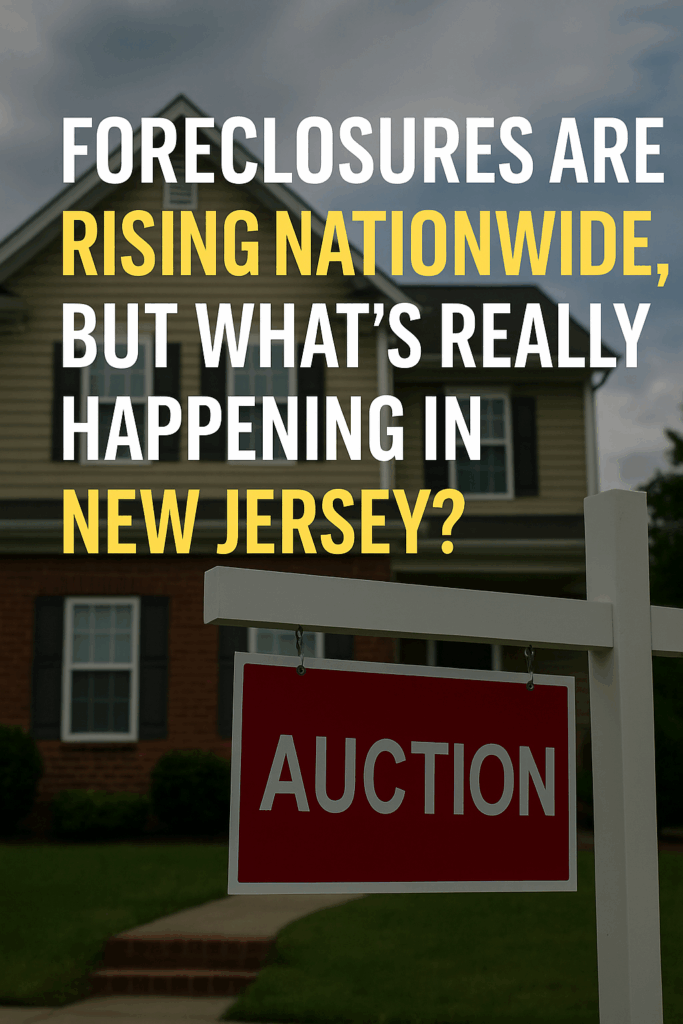
The latest numbers from ATTOM show that U.S. foreclosure filings (default notices, scheduled auctions, or bank repossessions) reached 187,659 in the first half of 2025. That is a 5.8% increase from the same period in 2024 and a 1.1% increase compared to 2023. Foreclosure starts rose 7% year over year and are up 41% compared to the first half of 2020. While foreclosure activity remains well below the peak levels of the Great Recession, the trend is moving steadily in the wrong direction.
Where New Jersey Stands
- 6,826 New Jersey homes received foreclosure filings from January through June 2025
- That equals 0.18% of housing units, ranking NJ 7th highest nationwide
- It equates to 1 in every 553 homes, compared to the national average of 1 in 758
- Filings are down 15.5% from 2024 and nearly 25% from 2023, yet NJ remains among the worst ten states for foreclosure rates
Atlantic City ranked among the worst metro areas in the U.S., with 0.25% of housing units receiving a foreclosure filing in the first half of 2025.
What’s Driving Foreclosures?
This is not just about irresponsible borrowing. Multiple economic stressors are hitting homeowners simultaneously:
🏦 Forbearance Has Expired
Mortgage forbearance plans put in place during the COVID-19 pandemic have ended. Homeowners who delayed payments now face fully reinstated obligations, often with back balances due.
💳 Consumer Debt at Record Levels
- Total household debt reached $18.2 trillion in Q1 2025, increasing by $167 billion in just three months
- Credit card balances stand at $1.18 trillion, well above pre-pandemic levels
- Nearly 40% of Americans are spending more than they earn, and only 44% report no trouble covering their monthly expenses
📉 Shrinking Savings
The personal saving rate dropped to 4.5% in May 2025, down from 4.9% in April.
The median household savings is just $8,000, while the average is skewed higher at $62,410 due to wealthier households. Most concerning, 59% of Americans cannot cover a $1,000 emergency expense without borrowing or going into debt. The average savings account balance is $22,292, but these figures mask the fragility facing millions of families.
🚗 Car Loan Delinquencies and Repossessions
- Approximately 5% of auto loans were delinquent in Q1 2025
- Subprime 60-day delinquencies reached 6.56%, a new post-pandemic high
- Over 1.7 million vehicles were repossessed in 2024, the most since 2009
💳 Rising Credit Card Pressure
- Minimum payment dependency and revolving balances are climbing
- Credit card debt has increased roughly 28% since Q4 2019, adding over $250 billion to household liabilities
📈 Interest Rates and Affordability
- Mortgage rates remain near 7%, crushing affordability
- Housing affordability is at its lowest point in 38 years
💼 Softening Job Market
While unemployment remains relatively low overall, job losses are mounting in sectors like retail, transportation, and tech. Lower-income households are most at risk as inflation persists and wage growth stalls.
🧾 NJ’s Tax and Insurance Burden
New Jersey remains the most heavily taxed state for homeowners.
- The median property tax bill in New Jersey hit $9,413 in 2024, the highest in the nation
- The effective property tax rate stands at 2.23%, also ranking first
- Homeowner insurance premiums are increasing rapidly, with some carriers raising rates by 40% or more, partly due to climate-related risks and litigation pressure
These costs continue to erode homeowner equity and financial flexibility.
Why NJ Homeowners Should Be Concerned
Although overall filings in New Jersey are down from recent years, we are still well above the national average and ranked among the most at-risk states. With household savings depleted, debt rising, and mortgage rates staying high, even a small disruption: a job loss, medical issue, or unexpected repair can tip homeowners into serious trouble.
The backlog from pandemic-era protections is clearing, and New Jersey’s traditionally long foreclosure timeline is starting to compress. Homeowners who are already behind may have less time than expected to find a solution.
What You Can Do If You’re Feeling the Pressure
If you are behind on payments or foresee a problem coming, do not wait. There are options available, but time is your most valuable asset.
- Contact your lender to explore hardship relief or modification programs
- Sell quickly, even below full market value, to avoid foreclosure and protect your credit
- Tap into housing counseling and legal aid through HUD-approved or nonprofit agencies
- Work with a local real estate expert like NJ House Partners to explore both cash offers and full-service listing options
🏠 Written by Kevin Hill, NJ Real Estate Specialist
📞 Kevin Hill: (201) 214-1349
🌐 Visit www.NJHousePartners.com for guides, tools, and confidential help
Final Takeaway
Foreclosure activity is climbing across the U.S., and New Jersey is not exempt. Though we are seeing fewer filings than last year, homeowners remain under extreme pressure from high taxes, rising insurance costs, low savings, and record consumer debt. The warning signs are everywhere.
If you are a New Jersey homeowner feeling the squeeze, you are not alone and you are not without options. Reach out today before the clock runs out.

